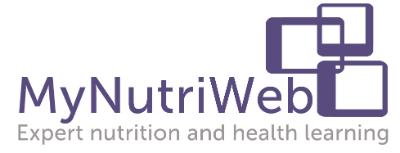Public Figures
We'd like to thank the following public figures for their support of Salt Awareness Week 2023:

Azmina Govindji RD MBDA, Consultant Nutritionist & Registered Dietitian
"Salt is typically an ingredient that manufacturers use to make food taste good. But we often don't realise just how much goes into everyday items such as bread, or how much is in seemingly healthy ready meals. I am honoured to support this year's Ditch the Salt campaign as I believe food manufacturers have an important role to play in public health. It is very possible to create deliciously tempting, affordable food with less salt - and even small improvements in formulations can confer significant benefits over time."
IG: azminanutrition
-350x396.jpg)
Charlotte Radcliffe RNutr, Registered Nutritionist
"The health impact of regular excess salt consumption can remain invisible in individuals for a long time, and this is why this awareness week is a particularly important one. It helps consumers understand that salt is present in a wide array of foods and highlights the need for the food industry to play their part in reformulating recipes. It can be a challenging process, but there are many solutions which help to make it achievable, and it is vital that this important work continues. Knowing that most cases of heart attacks and strokes are preventable means that we must all work harder to collectively minimise these risks."
https://thenutritionconsultant.org.uk IG: @the_nutrition_consultant Tw: @Nutr_Consultant
-400x267.jpg)
Charlotte Stirling-Reed RNutr, Registered Nutritionist
“Salt is in so many of our everyday foods & it can make it really challenging for families to feed babies and young children low salt diets as a result. I’m a massive advocate for balance & trying to help families vary what they offer/eat to try and reduce salt intakes as a whole. Something that would be super helpful for families across the UK would be seeing food manufacturers actively lowering levels of salt - especially in every day foods that families will eat together. We advise parents and carers not to add salt to baby and toddler meals, but that doesn’t take account of the (sometimes) high levels that are already in many of the foods we eat as a family every day. I’d love to see this change - anything that helps to make a parent’s job easier!”
https://www.srnutrition.co.uk IG: @sr_nutrition Tw: @SR_Nutrition
-350x350.jpg)
Fareeha Jay RD, Registered Dietitian
"I am pleased to support Salt Awareness Week 2023 by Action on Salt.
Increased salt intake contributes to high blood pressure leading to cardiovascular disease (CVD), heart attack and stroke. We should be having no more than 6g of salt per day, and most of my patients would say that 'they have never had a teaspoon of salt in a day', but little do they realise that salt is found in almost all foods they buy. Research suggests that, on average, adults in England consume 8.4g daily without realising. Processed foods, ready meals, pastries, crisps, and sauces are obvious, but there is salt in bread, cereals, biscuits, condiments, cold cuts, and nuts.
Even after reducing the added salt in our cooking, we still consume much salt. Moreover, that is where the food industry can play a crucial role. In order to enable populations to reduce their salt intake, the food industry needs to produce foods with lower salt content. This will improve the overall population's heart health and help prevent the loss of lives."

Nichola Ludlam-Raine, Specialist Registered Dietitian
This year I'm proud to be supporting Salt Awareness Week by Action on Salt, an annual campaign which aims to do just that - take action on salt!
As a nation, we are still regularly consuming over the recommended daily amount of salt (>6g) which is one of the main contributors of high blood pressure. Having high blood pressure causes excess strain and damage to the heart, increasing the risk of heart disease, strokes & heart attacks which can be fatal and cause deaths that could have been prevented.
Although most people think that the majority of our salt intake comes from adding salt to our food, around 75% is actually found within the food we already consume, such as processed meats, pizza, ready meals, tinned soups and savoury snacks such as salted nuts. We can of course utilise the information from food labels to decipher low in salt options (should they be consumer friendly) and include more whole foods, however - we can't escape it in our weekly shops! It's imperative that the food industry to do more to reduce the amount of salt in packaged goods (and improve food labelling) in order to reduce the amount we eat and improve the nation's heart health!
IG: @nicsnutrition
-350x504.jpg)
Rhiannon Lambert RNutr, Registered Nutritionist
In the Rhitrition clinic my team and I are always addressing salt and overconsumption in our clients' diets. Research estimates adults in England eat around 8.4g of salt every day, which alarmingly is over a third more than the UK recommendation of 6g (~1 teaspoon). Persistently high intakes of salt can lead to high blood pressure, which is a major risk factor for stroke, kidney disease, and cardiovascular disease. Many of these complications could be prevented if we can reduce our daily salt intakes.
One of the key challenges we face is that many people don’t necessarily realise they are eating too much, as many everyday items now have ‘hidden’ salt in them to extend the shelf-life. To help reduce your salt intake at home, check food labels, opt for lower salt products, or try cooking meals from scratch so you know how much salt is going in. You could also experiment with herbs and spices as an alternative to enhance the flavour of your dish instead too."
https://rhitrition.com/ IG: @rhitrition Tw: @rhitrition

Zoe Griffiths RNutr, Registered Nutritionist
I am really pleased to be supporting Salt Awareness Week once again this year. As a Registered Nutritionist (Public Health), I know the impact eating too much salt can have on our health. A diet high in salt can lead to raised blood pressure, which increases the risk of heart disease and stroke.
As 75% of our salt intake comes from manufactured foods that we buy, it can be difficult to cut down on salt intake. It is time for manufacturers to look further at reformulating their products to reduce the salt content in foods to make it easier for everyone to reduce their salt intake and prevent ill health.
https://zgnutrition.co.uk/ IG:@zg_nutrition Tw: @ZG_Nutrition

Tai Ibitoye RD, Registered Dietitian and Lecturer in Dietetics and Nutrition
"I am pleased to support Salt Awareness Week by Action on Salt! Even though salt plays a key role in human health like transporting water around the body, maintaining fluid levels and supporting muscle and nerve function. We just need a very tiny amount (less than 1 gram per day) to support human biological functions.
The current government recommendation on salt is to consume no more than 6 grams a day (which is equivalent to a teaspoon of salt). Yet, research shows that adults in England consume 8.4g a day, which is 40% above the national guideline. Too much salt in the diet can contribute to long-term chronic conditions and diseases such as but not limited to: hypertension, cardiovascular disease (CD), stroke, and kidney disease.
Most people don’t always realise they are consuming too much salt. Part of the problem is that food does not have to taste salty to be salty. Ready-meals, meat products and takeaways as well as snacks like crisps and biscuits tend to be high in salt; breads, breakfast cereals, canned soups, condiments, and sauces also contain levels higher than you might expect. While some food companies are reducing the amount of salt in many foods, others need to step up and follow suit.
On an individual level, there are steps that people can take to become more salt aware. One way to reduce salt intake is to look out for the salt content in everyday foods and go for the lower-salt options. Most food packaging has the salt content on the front, side or back. In addition to comparing salt content of foods, it is also worth looking out for words on food labels such as ‘brine’, ‘cured’, ‘picked’, ‘corned’ or ‘smoked’ as these foods are more likely to be high in salt and these should be consumed less often, in small amounts.
However, the onus is on food companies to ensure that they keep the salt levels in food products to a minimal to improve population health"
https://taitalksnutrition.com/ IG:@taitalksnutrition

Tanya Haffner RD, CEO, Founder MyNutriWeb
"Supporting salt awareness week is a no brainer. Our nation continues to consume far too much salt which is contributing to ill health and premature deaths. Most of our excess salt is hidden in processed foods. And this is crazy when science shows that we can all adjust our palate and enjoy foods with much less salt. Some members of the food industry have taken action showing that we can have success but many have not acted or gone far enough and CEOs and board members of these companies need to become accountable for causing the preventable loss of life from strokes and heart disease."


